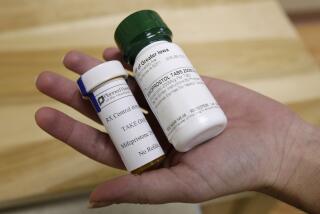Cost-cutting consumers could be taking risks with medicines
- Share via
Americans aren’t just cutting costs these days by clipping coupons -- they’re also making some potentially dangerous choices about prescription drugs, a Consumer Reports poll finds.
The third such poll, released today, surveyed 2,038 Americans about prescription drugs, including how they’re taking them -- or not taking them -- and their feelings about drug companies. Almost half (49%) of participants said they take at least one prescription drug, and on average they take 4.5 medications regularly.
But it’s what they may be doing with those drugs that raises concerns. About half (48%) said they resorted to cost-saving measures, up 9% from last year. Some in that group are postponing a visit to the doctor (21%), putting off a medical procedure (17%) or refusing a medical test (14%).
Also within that set, 28% of people are doing other things that could potentially cause harm: 16% don’t fill prescriptions, 13% have taken a drug that expired, 12% skipped a dose without checking in with the doctor or pharmacist, 8% cut pills in half and 4% shared their medicines.
Consumers are aware of and use generic drugs -- 98% of people know about them, and they make up 75% of the drugs that people take regularly. Yet those surveyed said their doctors don’t always recommend generics -- 41% reported their physician sometimes or never suggested opting for a generic prescription.
Not all surveyed were totally on board with generics: 39% had a concern or some mistaken beliefs about them, such as that they’re weren’t as effective as brand names (21%), had different side effects (22%) or weren’t as safe as brand names (14%).
Nor were they convinced that drug companies had no influence over what doctors prescribed. Among those surveyed, 85% were worried about pharmaceutical companies giving kickbacks to doctors for prescribing their medications, and 76% said they had concerns about doctors acting as spokespeople or being paid for testimonials from drug companies.
More to Read
Inside the business of entertainment
The Wide Shot brings you news, analysis and insights on everything from streaming wars to production — and what it all means for the future.
You may occasionally receive promotional content from the Los Angeles Times.









